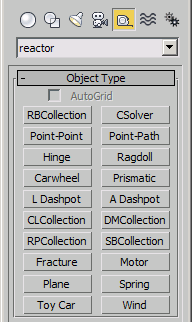Carwheel : Helper
 The Reactor dynamics system has been retired and REMOVED from 3ds Max 2012.
The Reactor dynamics system has been retired and REMOVED from 3ds Max 2012.
| Value > MAXWrapper > Node > Helper > reactor > Carwheel |
You can use this constraint to attach a wheel to another object - for instance, a car chassis. You can also constrain a wheel to a position in world space. During the simulation, the wheel object is free to rotate around a spin axis defined in each object's space. Linear motion is allowed for the wheel along a suspension axis. You can also add limits to the wheel's movement along this axis. The constraint's child body will always act as the wheel, while the parent will act as the chassis.
Carwheel constraints also have spin parameters. If these are nonzero, the constraint will turn the wheel during the simulation. You can specify a target velocity and a target gain - this is the maximum angular impulse that the motor can apply to the rigid body in order to achieve the target velocity.
When set to true , the Parent Body will be used in the simulation.
Get/Set the suspension limits.
Get/Set the suspension friction.
Get/Set the maximum angular impulse that the motor can apply to the rigid body in order to achieve the target velocity
When set to true , the constraint will be breakable. If its breakable limits are exceeded during simulation it will cease to exert impulses on the attached objects.
The linear breaking limit value used to when .isBreakable is set to true .
The angular breaking limit value used to when .isBreakable is set to true .
These two properties govern the impulses applied to the constraint's bodies in order to maintain the constraint, and so how strongly the constraint works to restrict their movement.
When set to true , the relative transform between the child and parent constraint spaces is locked - if you move the child space in the viewport, the parent space will move with it, and vice versa.
Interfaces
When set to true , the Parent Body will be used in the simulation.
Get/Set the Parent Body's transformation matrix.
Get/Set the Child Body's transformation matrix.
When set to true , the relative transform between the child and parent constraint spaces is locked - if you move the child space in the viewport, the parent space will move with it, and vice-versa.
These two properties govern the impulses applied to the constraint's bodies in order to maintain the constraint, and so how strongly the constraint works to restrict their movement.
When set to true , the constraint will be breakable. If its breakable limits are exceeded during simulation it will cease to exert impulses on the attached objects.
The linear breaking limit value used to when .isBreakable is set to true .
The angular breaking limit value used to when .isBreakable is set to true .
Get/Set the transformation matrix of the suspension node.
Get/Set the suspension limits.
Get/Set the suspension friction.
Get/Set the maximum angular impulse that the motor can apply to the rigid body in order to achieve the target velocity
Aligns the Constraint to the Parent Body.
Aligns the Constraint to the Child Body.
Aligns the Constraint to parent space.
Aligns the Constraint to child space.
Aligns the Constraint to both bodies.
Returns true if the Carwheel Constraint is valid, false otherwise. A valid Carwheel Constraint has the correct number of rigid bodies attached and is included in a valid constraint solver.

